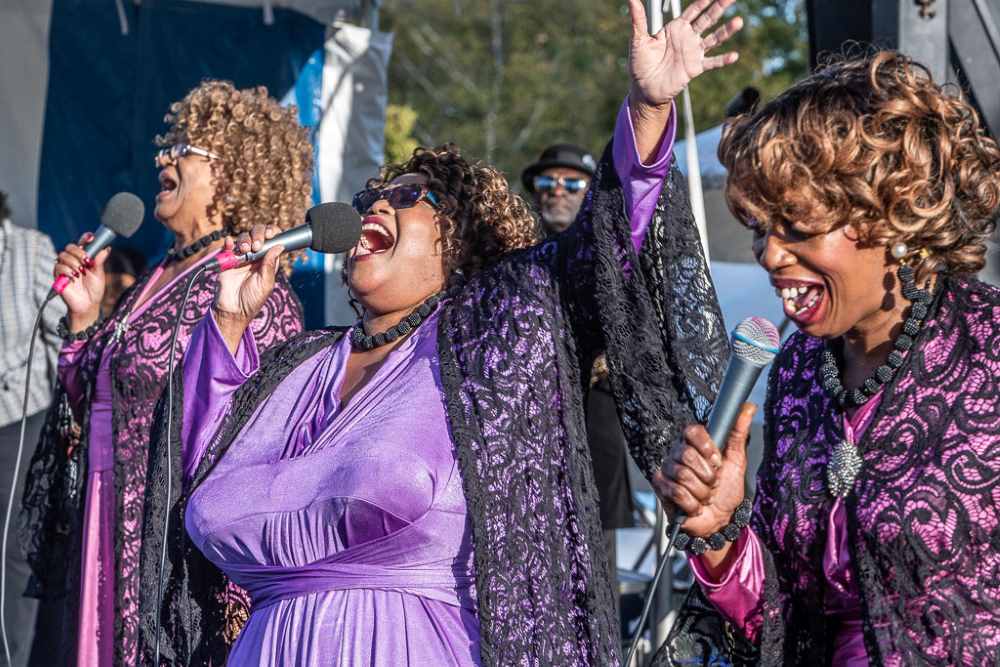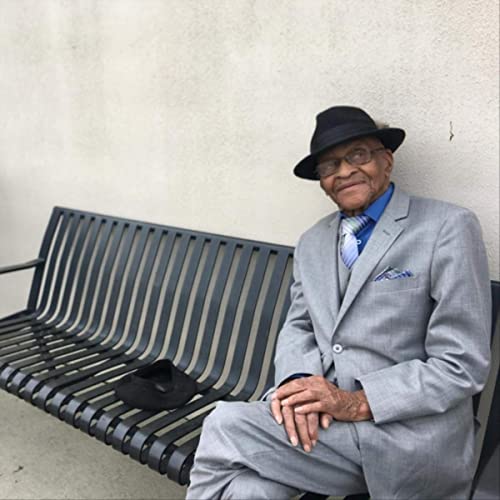By Robert M. Marovich
There’s no better way to kick off New York City’s 2024 Juneteenth festivities than by attending a musical program by the Legendary Ingramettes.
The effervescent female gospel quartet and NEA National Heritage Fellows will appear Friday, June 14, at Flushing Town Hall, a Smithsonian affiliate, as part of Queens Rising, the borough’s month-long celebration of culture.
It’s been a long and rough road, but also a redemptive journey for the Legendary Ingramettes, a family group founded more than sixty years ago by the late Maggie Ingram. “My mom was an incredible person who never knew the impact she had on gospel music and on the people that she encountered,” said Almeta Ingram-Miller, Maggie’s oldest daughter, the Legendary Ingramettes leader, and family historian.
Maggie’s life story is a case study in faith and persistence. Born in 1930 and raised on Mulholland Plantation in Coffee County, Georgia, Maggie Lee Dixon was pulled out of school after completing the third grade to work the tobacco and cotton fields with her parents. At sixteen, she married Thomas Ingram and sharecropped in Georgia while giving birth to three sons. When Thomas, a preacher, was called to pastor Wells Temple Church of God in Christ in Miami, the Ingrams moved to Florida, where Almeta and her sister Christine were born. In Florida, Maggie raised her five children while cleaning houses and taking in laundry. When he wasn’t ministering to the Wells Temple flock, Thomas was a groundskeeper at the Orange Bowl, keeping the stadium’s grass neatly trimmed with a push mower.
Thomas returned to Georgia when Maggie was in her late twenties, leaving her to raise their five children by herself. Almeta said that relatives stepped forward to help by taking some of the children but “Mom didn’t want to do that. She didn’t want to break up the family. I remember hearing her pray at night for help to keep her family together.”
One thing about Maggie: she always knew how to sing. She was particularly drawn to popular male gospel quartets of the 1930s and 1940s like the Dixie Hummingbirds and the Fairfield Four. She even sang lead with a male quartet called the Six Trumpets; their 1961 “Jesus Christ, the Baby,” recorded for Nashboro Records, remains a beloved Christmas staple. Maggie also taught her children to sing like a male quartet. “While the other little children are outside playing hopscotch and marbles,” Almeta said, “we were sitting in a circle in the living room. Mom broke a stick off a tree and used it to beat time. With no training whatsoever, she taught us to sing.”
Maggie and her children began singing publicly at their church and at community gatherings in Florida. At an appearance at the Longshoreman’s Hall, they opened for the Reverend C. L. Franklin and his gospel-singing daughter Aretha. Listeners were impressed by how grown-up Maggie’s young troupe sounded.
The six Ingrams ultimately left Miami in late 1961 to settle in Richmond, Virginia. Maggie purchased a used 1956 Chevy Bel-Air, packed her children in, and set off on a journey through the pre-Civil Rights South, where for Blacks, dangers lurked around every corner. Almeta recalled one particular road incident vividly:
“Remember, in 1961, there is no Interstate 95. We have to travel through every segregated town between Miami and Richmond. By the time we reach Dillon, South Carolina, Mom is so exhausted from driving she can’t go another mile. She pulls into a whites only gas station and leans her head on the steering wheel. Here comes this gigantic white guy from the service station. ‘Gal, what are you doing here?’ She says, ‘I’m trying to get to Richmond, Virginia. It’s just me and my five children.’ She begged him: ‘I need to sleep, and if you just let me sleep here, I’ll move on.’
“The man doesn’t say a word. He goes back in the service station, comes out with a chair and a shotgun. He sits down in the chair, puts the shotgun across his lap, and says, ‘Gal, you go on ahead and sleep. I’m going to sit here and watch over you while you sleep.’ He waved all the cars on with the shotgun. Next morning, he allowed us to go into the whites only bathroom and get washed up. ‘I don’t have much food here, just some crackers and sodas,’ he said, ‘but I want you to have them.’ He also asked if we had enough gas to get to where we were going. My mom said she would find a colored station up the road but he said, ‘You back up to my pump’ and we filled up.”
Maggie and her children arrived in Richmond on Christmas Eve, 1961, and the Ingramettes were soon wowing local churches with their “grown up” male quartet sound. While appearing at an AME Zion church choir’s anniversary, they met Joe Williams of the Harmonizing Four who happened to be in the audience. He invited Maggie and her children to open their anniversary program, where the family group shared the stage with their inspirations the Dixie Hummingbirds, the Soul Stirrers, and the Swan Silvertones. “It was surreal,” Almeta reflected, “that we got to meet and sing with these quartets that we had only heard on record or on the radio. They were larger than life.”
From there, the Ingramettes hit the gospel circuit, singing with more of the genre’s top artists such as the Clara Ward Singers, Joe Ligon and the Mighty Clouds of Joy, the Pilgrim Jubilees, and both sets of Blind Boys (Alabama and Mississippi). They started recording as a group in 1964. For decades, Maggie Ingram and the Ingramettes were staples on the circuit. It is said that that group became so well liked that Albertina Walker tried to recruit Almeta for the Caravans (Maggie said no).
Maggie tried her hand at songwriting. She not only drew inspiration from her life experiences, but she also incorporated what Almeta called a “redemptive moment”—that no matter how dire things are, life will get better. Her topical songs with redemptive moments such as “Richmond, Virginia Flood” and “The Miami Riot” became gospel radio favorites. She was crowned the Gospel Queen of Richmond, Virginia, and the Ingramettes the First Family of Gospel Music.
In addition to singing, Maggie took a job as a maid for a Richmond family. It turned out that her new employer was none other than Oliver W. Hill Sr., lead attorney for the Virginia State Conference of the NAACP. This experience, Almeta said, changed her mother’s perspective on life. “Now Mom is in the middle of the civil rights movement. For her, it was no longer just about her five children. She couldn’t rest if other people were disenfranchised. She said, ‘I’m only one person, but Mr. Hill is telling me that I’ve got to do what one person can do.’
From that moment, Maggie and the Ingramettes supplemented their recording and program appearances with community service, including visits to a minimum security prison, where they sang every fourth Sunday. Maggie even brought some of the prisoners’ families to the programs so they could see their loved ones. This kind gesture formalized into Family Day in the prison system.
Before Maggie died in 2015, she began preparing Almeta to take over the reins of the Ingramettes so the group would continue after she was gone. Today, in addition to Almeta, the Legendary Ingramettes consist of Almeta’s niece Cheryl Maroney-Yancey and sister-in-law Carrie Jackson. Not only does the group still record and perform gospel music in the traditional male quartet style, but they also carry on Maggie’s legacy by doing ministerial work at the Virginia Correctional Center for Women, at nursing homes, and throughout the community.
“If we never get Grammys or Stellar Awards, that’s not a problem,” Almeta said, “because the Scripture says that when we step up before the judgement, we’re not going to be asked how many Grammys we got. We’re going to be asked if we visited the sick. Did we feed the hungry? Did we bring a word of hope to someone in prison? Now if that’s the curve we’re graded on, we’ve got As!”
For more information about the June 14 event at Flushing Town Hall, which starts at 7:15 p.m., visit https://www.flushingtownhall.org/the-legendary-ingramettes.
Written by : Bob Marovich
Bob Marovich is a gospel music historian, author, and radio host. Founder of Journal of Gospel Music blog (formally The Black Gospel Blog) and producer of the Gospel Memories Radio Show.











 Visit Today : 10
Visit Today : 10 This Month : 51
This Month : 51